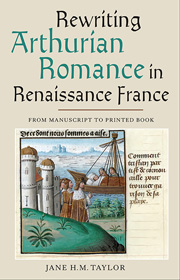Book contents
- Frontmatter
- Dedication
- Contents
- List of illustrations
- Acknowledgement
- Acknowledgements
- Abbreviations
- Introduction
- 1 Pierre sala, Poacher
- 2 ‘Books Printed Here’: The Business of the Print Shop
- 3 ‘A condition of survival’: Lancelot and Tristan
- 4 ‘Skimble-Skamble Stuff’: Meliadus, Merlin, Greaal
- 5 ‘Imperious Seductions’: Giglan and Perceval
- 6 ‘Satyric Scenes in Landscape style’: Amadis de Gaule
- 7 ‘Fruitlesse Historie’: Maugin's Tristan, Rigaud's Lancelot
- Afterword
- Appendix 1 Rough chronology of Publication
- Appendix 2 Sainct Greaal (1516) v. Vulgate Queste
- Appendix 3 Structure of the Roman de Giglan
- Bibliography
- Index
- Already Published
5 - ‘Imperious Seductions’: Giglan and Perceval
Published online by Cambridge University Press: 05 March 2014
- Frontmatter
- Dedication
- Contents
- List of illustrations
- Acknowledgement
- Acknowledgements
- Abbreviations
- Introduction
- 1 Pierre sala, Poacher
- 2 ‘Books Printed Here’: The Business of the Print Shop
- 3 ‘A condition of survival’: Lancelot and Tristan
- 4 ‘Skimble-Skamble Stuff’: Meliadus, Merlin, Greaal
- 5 ‘Imperious Seductions’: Giglan and Perceval
- 6 ‘Satyric Scenes in Landscape style’: Amadis de Gaule
- 7 ‘Fruitlesse Historie’: Maugin's Tristan, Rigaud's Lancelot
- Afterword
- Appendix 1 Rough chronology of Publication
- Appendix 2 Sainct Greaal (1516) v. Vulgate Queste
- Appendix 3 Structure of the Roman de Giglan
- Bibliography
- Index
- Already Published
Summary
Le plus souvent, le seul indice de l'usage du livre est le livre lui-même. De là, les sévères limites imposées à toute histoire de la lecture. De là, aussi, son impérieuse séduction.
Readers, says Certeau, as we saw in Chapter 1, are poachers: they ‘use their wits […] to insinuate […] their inventiveness into the cracks of cultural orthodoxy’. The three romances that we explored in the last chapter were read, and certainly edited, but largely in the interests of narrative efficiency: with Meliadus, to avoid a clash with a well-loved and well-known Tristan; with the Prophéties, to impose some coherence on an indecipherable original; with the Hystoire du sainct Greaal, to fit a third text into a compendium of Grail romances. In this chapter I turn to two other romances, much less well known and neither of them published in modern editions, where rather than simply reinvent a mise en texte, the publishers and their editors have appropriated the originals, where the editorial processes are active and activating, and where, rather than submit to the authority of the sources, the editors challenge cultural orthodoxy. The first romance, the Roman de Giglan, perhaps published in around 1520, is a rather slapdash amalgamation of three existing romances; the second, the Roman de Perceval, published in 1530, is a mise en prose of Chrétien de Troyes's Perceval and a majority of its Continuations.
- Type
- Chapter
- Information
- Rewriting Arthurian Romance in Renaissance FrancePublishing from Manuscript to Book, pp. 119 - 146Publisher: Boydell & BrewerPrint publication year: 2014



